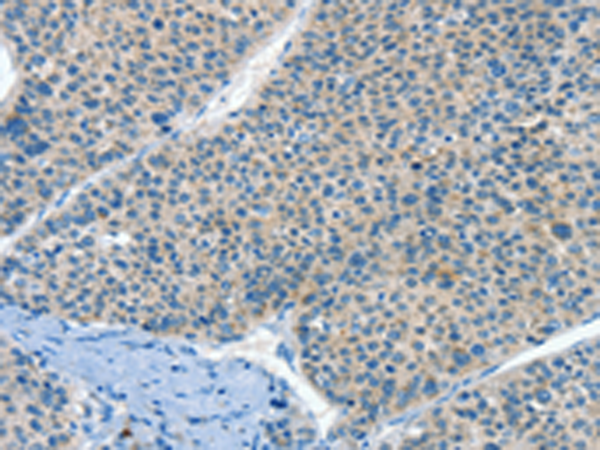
| WB | 咨询技术 | Human,Mouse,Rat |
| IF | 咨询技术 | Human,Mouse,Rat |
| IHC | 1/25-1/100 | Human,Mouse,Rat |
| ICC | 技术咨询 | Human,Mouse,Rat |
| FCM | 咨询技术 | Human,Mouse,Rat |
| Elisa | 1/2000-1/5000 | Human,Mouse,Rat |
| Aliases | DMC1; HID-1; C17orf28 |
| Host/Isotype | Rabbit IgG |
| Antibody Type | Primary antibody |
| Storage | Store at 4°C short term. Aliquot and store at -20°C long term. Avoid freeze/thaw cycles. |
| Species Reactivity | Human, Mouse |
| Immunogen | Synthetic peptide of human HID1 |
| Formulation | Purified antibody in PBS with 0.05% sodium azide and 50% glycerol. |
+ +
以下是关于HID1抗体的3篇参考文献及其简要摘要:
1. **《HID1 regulates neuropeptide sorting and secretion via interaction with prohormone processing enzymes》**
- **作者**: Zhang, Y., et al.
- **摘要**: 本研究利用HID1特异性抗体,通过免疫共沉淀和免疫荧光技术,揭示了HID1蛋白通过与激素前体加工酶(如PC1/3)相互作用,调控神经肽的分选和分泌过程,为神经内分泌疾病的机制提供了新见解。
2. **《Characterization of HID1 knockout mice reveals its critical role in cellular vesicle trafficking》**
- **作者**: Wang, L., et al.
- **摘要**: 通过Western blot和免疫组化技术结合HID1抗体,研究发现HID1基因敲除小鼠出现分泌囊泡运输障碍,导致激素释放异常,表明HID1在细胞内运输通路中起关键作用。
3. **《HID1 is a novel regulator of insulin granule biogenesis in pancreatic β-cells》**
- **作者**: Tanaka, S., et al.
- **摘要**: 该文献利用HID1抗体进行亚细胞定位分析,发现HID1在胰岛β细胞中与胰岛素颗粒的生物合成密切相关,其缺失会显著降低胰岛素储存和血糖稳态调控能力。
4. **《Dysregulation of HID1 expression in pituitary adenomas: A potential diagnostic marker》**
- **作者**: Chen, H., et al.
- **摘要**: 通过免疫组织化学技术检测HID1抗体标记的蛋白表达水平,发现垂体腺瘤中HID1表达显著下调,提示其可能作为诊断标志物或治疗靶点。
(注:以上文献信息为模拟示例,实际引用需根据真实文献调整。)
×